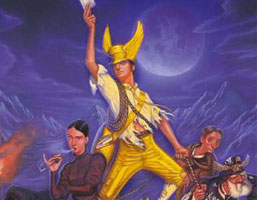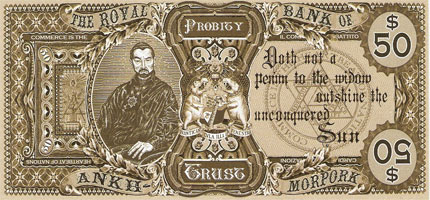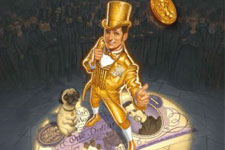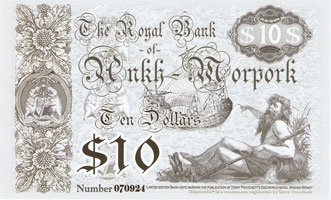“Making Money”: A Moist Financial Adventure
November 17th, 2007
What? I do things outside of anime/manga/games/conquering Europe.
I do have to admit that despite my love for anime and assorted Eastern media works, the swashbuckling rogue remains one of my favorite character archetypes. It’s really not something that you’ll see often from more collectivist works, and even the few ones that you do, such as Lupin III, go out of their way to have a fine party of companions and friends to give them strength/get them through their challenges/form the Spirit Ball to defeat Frieza. The more individualistic societies give us such fanciful rogues as the likes of Robin Hood, the Scarlet Pimpernel, El Zorro, or hell, even The Doctor. Even works seemingly under the veneer of heroes working together, such as Le Morte d’Arthur tend to be filled more with individual tales of bravery and triumph instead of mutual struggle. America especially has a persecution complex from being the tiny upstart some 200 years prior and its collective folktales and literature especially espouses the supremacy of the underdog individual against the big bad British societal tyrant. We’ve raised up antisocial heroes like Harold Hill, Henry Walden Jones, and Rocky Balboa, and created a mystique around them that they’re the kind of men that boys should grow up to be.
Scaling backwards towards my original point, the devilishly intelligent, yet still generally well-meaning knave remains one of my favorites in literature and media works. I’ll even go ahead and put out Harrison’s James diGriz as my favorite hero in any work. So, with much anticipation (and about two months after it came out) did I sink my teeth into Terry Pratchett’s latest Moist von Lipwig novel, Making Money. I’ll do my best to avoid spoilers, so if you’re still waiting on the softcover release, you can read without fear.

Moist himself is a con-artist and offered the position of postmaster by the tyrant of Ankh-Morpork and perennial fan favorite, Lord Vetinari, in a previous novel (Going Postal). Making Money picks up the thread of the story some years later when Moist, tired of his boring life as Postmaster General, has taken to breaking in and out of his office, as well as joining the fraternity of Extreme Sneezing in an attempt to regain the past excitement of his more licentious days. In not too much time, though, he ends up meeting a dying woman who bequeaths unto him her dog, Mr Fusspot, and bequeathing unto the dog 50% of the mint and largest bank in the city (Mr Fusspot already owned one share) and under threat of death, he’s now in charge of both the dog’s safety, and bringing a mint to heel despite whatever the other 49.99% of its owners would like to do about it.
Unfortunately though, I really didn’t think this had anywhere near the charm of Going Postal. I welcome the lack of the painfully forced internet puns that suffused the prior, but at least they were new. Making Money seems to be fairly undirected and a lot of it a rehash. Aside from the directly paralleled plot and flow of Going Postal (which Pratchett does make some nods to), it seems like we’ve seen so many other of the main themes before, only in a slightly different form. Instead of the Post Office, we have the Mint, instead of a gender dysmorphic dwarf, we have a gender dysmorphic golem, instead of meticulous and somewhat unhinged Stanley we have meticulous and somewhat unhinged Mr Bent, instead of Groat and the Trans-Dimensional Letter Sorter, we have Herbert and The Glooper, and instead of Moist we have… well… we still have Moist, but such an incredibly watered down and passive version of him that it’s hard to believe that he’s the same guy.
That’s probably where the crux of my critiques with Making Money lie. Pratchett just didn’t do a particularly good job in bringing his characters to life this time around, and even the pre-established ones like Moist and Spike felt listless. Moist’s grandiose ambitions and baronial proclamations were all but absent. There are a couple moments where the spark seems present, but for the vast majority of the novel, Moist is a passive character as events unfold around him and even the firey Spike is uncharacteristically subdued. Only Vetinari, who plays a much larger role than usual, seems to have his usual joie de vivre.
Part of the problem also lies with the very flat and uninteresting antagonist, Cosmo Lavish who is at once obsessed with reclaiming his family’s bank from Moist, but also harbors a secret fantasy that he could literally become Vetinari. He’s simply too much of a buffoon to be taken seriously and never once hinders Moist’s plans at all. The story would function perfectly well without him present, which is really something that you don’t want out of your antagonists. The other minor antagonist from Moist’s past, Cribbins, barely even has an impact on the story as well, and even Moist literally forgets that he exists before he appears and then is immediately dealt with as things wind down.
The only other major character of note is Mr Bent, the de facto commander of the bank and born with an unnatural grasp of numbers instead of a sense of humor. Mr Bent’s dark secret will probably come as a surprise to less rabid fans of the Discworld series, but Pratchett used the exact same joke and presentation in Men at Arms, so even while I wasn’t completely certain, I was waiting for the joke/reveal from almost the first page that Bent showed up.
In addition, the resolution at the end just seemed weak. It was likely a result of the passive ride Moist had through most of the novel, finishing with a dénouement that honestly felt somewhat trite. The problem is that it takes about 100 pages for Moist to actively become a participant in the story, and then he steps back again after 50 pages and the final 250 flow on their own without any grand schemes, plots, or energy.

Not everything was that bad though. Pratchett’s keen humor shined through more than a few times, just not as much as I’d like. The twist concerning the Golden Golems, for example, was wonderful. I was expecting something a little different, but it’s still fun to be surprised. One of the highlights was the discovery of the previous owners collection of… rubber implements, which turned into a running gag as Mr Fusspot dragged one around as a toy for the remainder of the novel. I also chuckled at the politically correct Department of Necromancy Postmortem Communications segments and the jabs at the antiquated standards of modesty. Still… aside from Vetinari though, Mr Fusspot was probably the most entertaining character of the lot.
At any rate, if you’ve never read a Discworld novel before, Making Money is not the place to start. If you’re already a fan of Pratchett, there some fun to be had, but it’s not one of his best either. Pratchett’s talent is bringing his characters to life and making them engrossing in their ridiculous, yet somehow familiar world. He simply just didn’t do his usual excellent job of that this time around. It’s telling when a dog named Mr Fusspot outperforms all the rest of the cast. Still worth buying for any fan of the series, but it’s probably best to just wait for the softcover. This isn’t one you’ll be hauling out to reread any time soon. Â
Posted in Miscellaneous | 6 Comments »


IMPUDENT FOOL!